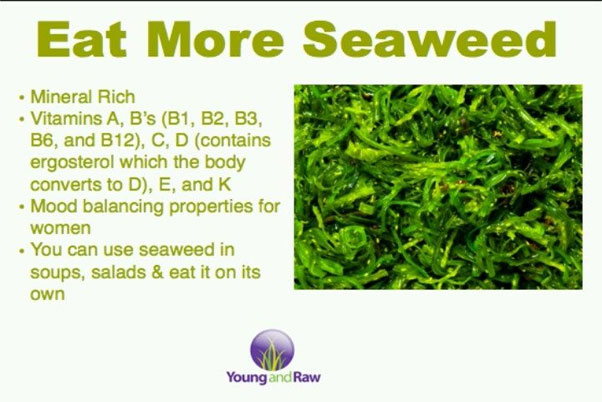Seaweed Superfoods
In this section of Seattle Organic Restaurants, I’m going to talk about seaweed superfoods and their health benefits. Seaweed lives in the ocean and has high concentration of important vitamins and minerals. Seaweed can be a part of healthy recipes and is a great source of minerals for people with mineral deficiencies. Seaweeds in both dried or fresh form can be added to many healthy dishes such as miso soup, sushi and other fermented foods. Seaweed has also 8 times more calcium than beef and milk.

Seaweed can purify the blood and the chemical composition in seaweed is very similar to blood plasma in human beings. Seaweed alkalinizes the blood and protects the body against toxins and heavy metals like mercury, harmful salts, other pollutions and radiation. Seaweed also neutralizes the acidy in the body and can help weight loss. Because of the unique structure of seaweed, this plant is able to absorb a great amount of nutrients from the ocean and the environment.
But aren't our oceans polluted because of radiation, sewage and other wastes?
Little bit of information can be dangerous and misleading. There is pollution and infestation in every part of the planet including ocean, soil, air, and etc. One has to remain logical and rational and must consider that oceans and waters actually contain most of the planet and have much less susceptibility to pollution and contamination than soil. Also, due to ocean's ecosystem and filtration process, it can heal itself must faster than, let's say, soil.
Seaweeds are naturally full of vitamin K and are part of the ocean's ecosystem filtration process. For instance, if you look at any lakes that are damaged due to fungi or introduction of uninhabitable fish or parasites, the marine biologists clean the lake by introducing a filtration system to clean the water. This is man-size project usually. Compare it to ocean-size nature filtration system, and soon rationale and logic prevails and you can see that oceans are not as damaged or polluted as you may think compared to, let's say, the French fries or hamburgers that you eat or the non-organic fruits that you eat which were picked from trees/bushes a week before they are ripe (hence nutrition deficient).

Kelp: Kelp is a great source of magnesium and calcium with high protein content. Kelp can be used both in powder and capsule form and is highly recommended to people with mineral deficiencies.
Nori: Nori is among red algae’s popular group in California. Nori is mostly used in wrapping sushi rolls. Nori is rich in Vitamins A, C, B1, B2, B12 and B5, amino acids and omega 3 fatty acids.
Wakame: Wakame has many minerals and nutrients such as vitamins A, C, E and K. Wakame can prevent different types of cancer, especially breast cancer and is a great source of minerals such as calcium, magnesium, iodine and iron. Wakame is used in miso soup, sandwiches and salads.
Irish Moss: Irish moss is full of essential nutrients such as vitamins B and C, protein, zinc, potassium, magnesium, calcium, phosphorus and iodine. Irish moss has amazing healing effects for nausea, food indigestion, constipation, heart burn and ulcers. You can add Irish moss into miso soup. Irish moss has antibacterial properties and protects the body from bacteria and softens the skin.
Kambu: Kambu is a high source of nutrients such as magnesium, iodine, calcium and protein. Kambu reduces the chances of cancer and is a good source of minerals for people with mineral deficiencies. You can add kambu to beans and sprouts to improve digestion and reduce gas.
Arame: Arame is a good source of nutrients such as iron, zinc, manganese, vitamins A and K, folate and iodine. Arame can improve hair, skin or nails and can boost the body’s immune system against bacteria and disease such as cancer.
Dulse: Dulse is a great source of nutrients such as protein, fiber, vitamins A, C, E, B6 and B12 and minerals such as manganese, phosphorus, iodine and potassium.


